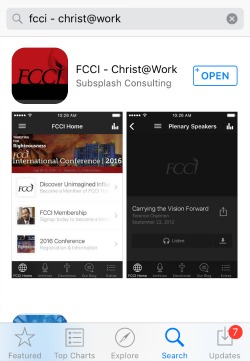
Make Daily Bible-Reading a Part of Your 2017 With the FCCI App!
Download the FCCI App, and use our Bible-reading plan!
This past Wednesday, Barna released a study entitled, “Bible Reading in 2017: A New Year’s Resolution”, which examines American’s habits and motivations in reading the Scriptures.
During the first week of January 2017, millions of Americans hit the gym, opened a savings account, enrolled in a class or started a new diet, vowing to keep their resolutions to make big lifestyle changes in the new year. Sadly, most of those December 31 aspirations have already started to gather dust, casualties of the stresses and demands of life. Undoubtedly, some chose to focus their resolutions on exercising their spiritual muscles through Bible reading. So what level of commitment do they show toward their Scripture-reading habits? In a study conducted in partnership with American Bible Society, Barna looks at the Bible reading desires and motivations of American adults. Do Americans wish they read the Bible more? Has their reading increased or decreased, and why?
Who Wants to Read the Bible?
In an era of significant change, when so many cultural touchstones are up for grabs, what compels people to read an ancient document, and what prevents them from reading it? A majority—and significant plurality—read the Bible because it draws them closer to God (57%). This means that for many Americans, Bible reading is a pillar of their faith. Most Americans though, are not satisfied with their current level of Scripture reading. A majority—about six in 10 American adults (61%)—express a desire to read the Bible more than they currently do, while a little more than one-third (36%) don’t. These numbers have remained relatively stable over the years since 2011 (see chart). The groups who desire more frequent Bible reading than their counterparts are females (68% compared to 54% of males), Boomers (68% compared to 55% of Millennials), non-white Americans (67% compared to 58% of white American) and those with no more than a high-school education (67% compared to 56% of college graduates). Seven out of 10 (70%) southerners want to read the Bible more, an especially high number compared to their western and northeastern neighbors (55% each), and perhaps unsurprisingly, born-again (85%) and practicing Christians (84%) are the most likely to desire more Bible-reading in their day-to-day lives.

“It should not come as a surprise that the majority of Americans wish they read Scripture more than they do,” says Roxanne Stone, editor in chief of Barna Group. “We have consistently seen in our research that, even with skepticism on the rise, Americans still hold the Bible in high regard. After all, two-thirds of Americans (66%) agree that the Bible contains everything you need to know to live a meaningful life—why wouldn’t you want to read such a book more often?
“However, like other new year’s resolutions, such as exercising more and eating healthier, Scripture reading is often an aspirational goal,” continues Stone. “It’s a goal that for most people probably doesn’t feel necessary to survival and so can easily get swamped by the day-to-day demands of a busy life. And who isn’t leading a busy life these days? Scripture reading takes time and focus—two things that feel like scarcities in today’s fast-paced and on-demand culture. Like the exercise, like the diet, regular Bible reading does not offer instant pay-off. It’s a discipline whose rewards are reaped over the long-haul.”
Need help making Bible-reading a part of your New Year? Download the FCCI App, and use our Bible-reading plan! This easy to follow plan allows you to read Scripture passages within the app and complete the whole Bible in one year! It’s an easy way to incorporate daily Bible reading into your routine.



